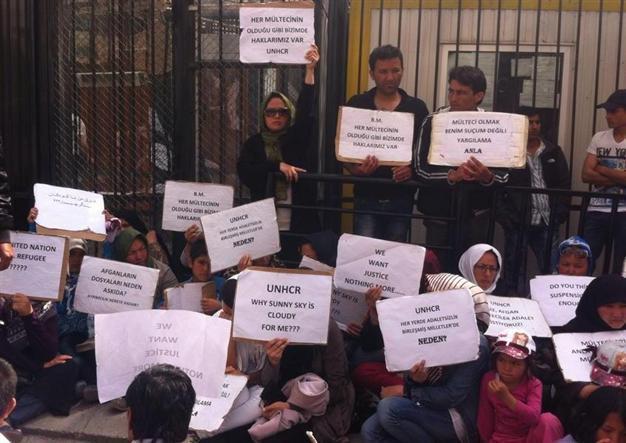Afghan refugees suspend Ankara sit-in after 53 days, urge UNHCR to meet demands
ANKARA

The number of protesters in front of the UNHCR reached 200 in the final days of the sit-in, including women, children and those with disabilities.
Afghan refugees suspended a sit-in protest in front of the Ankara headquarters of the U.N. refugee agency (UNHCR) on June 7 after 53 days amid increased pressure from the police, vowing to return to demonstrate if they did not receive a concrete answer to their demands.
The protests highlighted the difficult condition of Afghan refugees living in Turkey, particularly following the UNHCR’s decision to freeze all their applications months ago. Some protesters even launched hunger strikes, sewing their mouths shut, but they were eventually forced to abandon their action by police and medical workers.
Releasing a statement, the group called for fair procedures of evaluation to grant asylum and working permits during the waiting period for their applications.
“We demand that the Afghan refugees that the applications files of Afghan refugees be evaluated the same way as other refugees,” the statement said, also calling on Turkey to grant better conditions for people given temporary protection.
“We call for working permit for refugees so that they can provide for their family’s needs and the education of their children. Or the UNHCR shall assume the all the costs for the living of refugees, including rent, food, health and education expenses,” the statement also said.
Afghan refugees also added that they would return to demonstrate if their demands were not met. The number of protesters in front of the UNHCR reached 200 in the final days of the sit-in, including women, children and those with disabilities.
Around 30,000 Afghans live in Turkey, mostly in satellite towns far from the big cities where they are sent by the authorities during the evaluation of their asylum application.
Turkey only grants asylum to citizens of Europe due to a geographical restriction, a controversial clause that was not removed in the new law on foreigners that entered into force two months ago. Experts also criticize the vague definition of the status of temporary protection, which results in arbitrary policies in terms of providing services to communities of refugees according to their citizenship.
